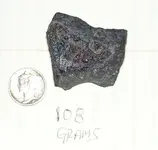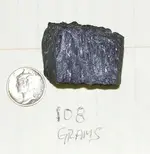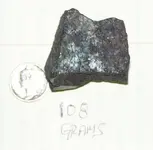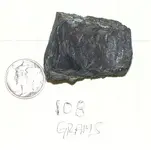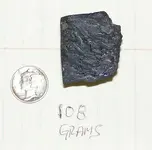Sorry, I just couldn't resist putting in my $.02. What if you (say you) found it in a neighboring country, like Canada or Mexico? The banks might buy gold in those countries, even if the rate is lower than here. I'm not going to do the research for you. But, I've wondered the same thing, and thought of this. You might even want to re-file on an old claim before you make your discovery. Okay, I'm ducking down now so the snipers won't get me.
You are using an out of date browser. It may not display this or other websites correctly.
You should upgrade or use an alternative browser.
You should upgrade or use an alternative browser.
How would you sell a cache?
- Thread starter TXPlugKutter
- Start date
Prime
Full Member
I totally agree with SWR. Document & Record. When Mel found the Atocha the tax laws read that Treasure was taxable only when it was sold or accepted in liew of wages. This may or may not still be true.
Despite what the anti-government types put out, if you keep it open, upfront and legal (in other words, jump through their hoops) you will be fine. On the other hand. if you decide to play pirate, then you will also need to be willing to accept the consequences should you be caught.
Which way you decide to go of course is each persons own choice. What personally irritates me is when a pirate does go down, they immediately start whining about how they were forced to be a pirate because of the laws. This is pure bull!!!! If you find a Treasure, very cool. If you decide to Pirate it, that's cool too!!!! Should you get caught, show some class for Christs sake. Your decision was made out of greed people. It's just that simple (and there's nothing wrong with that either), so don't blame it on anyone else.
Deepsix
Oh heck, going about it the "nice, open way" would be swell, but honestly, how much of that find would you get to keep? Which way is it finally? Do you get to keep most of your finds, or does the US gov take it away from you? Canada has a confusing law that is a bit vague, but after speaking to a local, unfriendly archivist, it's my current understanding that anything "old" that is either buried under ground or sitting under water belongs to the government. How they figure that must surely be laughable.
If I found a cache, or a "treasure chest", I'd view it as the relinquished property of the person who buried it. If it was buried by a private citizen, then it never belonged to the government in the first place, and so why should it suddenly belong to the government now? Assuming that the person in question paid the taxes on their wealth, paid their dues, etc, that treasure should be free from a government hold on it.
It could lie there in the dirt for the next thousand years and nobody would ever bother to find it, including the current landowners. And what does happen to these treasure finds when the government confiscates them? Who tracks where this stuff goes to? Does it go on a fabulous display somewhere in a museum so that the people can admire a part of "their heritage"(I use quotes here because I don't see how a "private" wealth cache would even be considered a part of a country's heritage, unless it had some known historical significance), or does it go to some museum vault only to be forgotten about?
We, as treasure hunters, take a leave from the grind of ordinary work to instead reach for higher goals, to chase after the stuff that dreams are made of. We aim to defy the odds and the words of naysayers and give it all our best to find those elusive riches. We put time, effort, and money to seek something that the average person would consider absurd, and for our efforts we deserve to be fully compensated.
I have no problem with paying taxes on my finds, I have no problem if the government takes it and pays me full market value for it, I have no problem with it sitting in a museum display for all to admire(in fact, I'd really like that, it would fill me with a sense of pride). But I'll be a monkey's uncle before I think it's fair to get a 10% share, or maybe even nothing, for my efforts.
And one note about this whole "preserving our national heritage" argument. Britain has far, far more history than the US and Canada combined, yet they choose to fully compensate the finder of a cache for his or her effort. So I ask, what's the problem over here in North America? Why can't our governments adopt the same view? What's the problem? Oh I know.....it's greed and stupidity.
Furthermore, what if a cache originally belonged to the Brits, or the French? Would the government still think it has a claim to it?
S
stefen
Guest
For Sale, Cash Only
Seamuss
Bronze Member
- Joined
- Jan 27, 2009
- Messages
- 1,160
- Reaction score
- 10
- Golden Thread
- 0
- Detector(s) used
- Garrett Scorpion, Garrett pro pointer
If your selling it a piece at a time or in small lots, there are always guys like me that buy and ("don't remember where I found this item") manage to keep very quiet about it.
K
Kentucky Kache
Guest
SWR said:No, the US Government does not take it away from you.
Do you know this by experience? If so, why not share your story with us.
K
Kentucky Kache
Guest
SWR said:lastleg said:Cache Crazy:
You no trickum SWR that easy. Hee Hee
Perhaps 'Crazy' could cite some cases where the Government took away somebodies cache or treasureEven Mel Fisher ironed things out with the State, and got to keep the lion's share
Oddly enough...you only read about these conspiracy theories on treasure hunting forums
Easy there cowboy. I was only asking if you KNEW what you were talking about, or just blowing hot air. I guess I got my answer.
I don't hold a conspiracy theory about the matter, but I do know OF (same as you) people who had MOST of their treasure taken away. I'm guessing (according to accounts I've read) there have been those who reported their find and came out okay. But I'm also guessing (according to accounts I've read) there have been those who've seen it otherwise.
ricboylin
Greenie
- Joined
- Jul 17, 2009
- Messages
- 11
- Reaction score
- 0
- Golden Thread
- 0
- Location
- TEXAS & MEXICO
- Detector(s) used
- Minelabs
What would someone do if he found dore' bars?? I mean how would you know how pure they are without taking them somewhere to be tested? By reading all the post it would be like finding a piece of scrap iron because it would be impossible to get assayed!
Real de Tayopa Tropical Tramp
Gold Member
- Joined
- Nov 8, 2004
- Messages
- 14,582
- Reaction score
- 11,947
- Golden Thread
- 0
- Location
- Alamos,Sonora,Mexico
- Primary Interest:
- All Treasure Hunting
HI, not really, just ask my buddy SWR for the addresses of some good assayers. Personally, after paying over 55% up front taxes and who knows how many hidden taxes, plus having served in two wars, I rather feel that I have paid my dues to what was once a free society. After all, if the gentleman in charge of the IRS can't 'remember' to pay HIS yeah many thousands of dollars in back taxes, why should I worry about the moral aspects?
Don Jose de La Mancha
Don Jose de La Mancha
Nullers
Jr. Member
- Joined
- Mar 11, 2007
- Messages
- 96
- Reaction score
- 6
- Golden Thread
- 0
- Location
- Ridgecrest, California
- Detector(s) used
- Fisher Gold Bug 2 White's MXT
Interesting topic and a lot of good information. Just curious about Dore bars. If one was lucky enough to find some, how and where would you go to get it refined?
Real de Tayopa Tropical Tramp
Gold Member
- Joined
- Nov 8, 2004
- Messages
- 14,582
- Reaction score
- 11,947
- Golden Thread
- 0
- Location
- Alamos,Sonora,Mexico
- Primary Interest:
- All Treasure Hunting
Good morning Nullers: Just take a sample to any competent assayer's office, no problems. They don't normally report to anyone except you, because of an understandable Confidence factor. A good assayer, under a complete analysis, can prob tell you where your Gold came from. They do keep records of every assay for many reasons, similar to any business..
In the case of a bar, of any sort or condition, I personally would get an Atomic Absorption test or a simple spectrographic analysis which will basically show every component of the bar.
L U C K .
Don Jose de La Mancha
In the case of a bar, of any sort or condition, I personally would get an Atomic Absorption test or a simple spectrographic analysis which will basically show every component of the bar.
L U C K .
Don Jose de La Mancha
Nullers
Jr. Member
- Joined
- Mar 11, 2007
- Messages
- 96
- Reaction score
- 6
- Golden Thread
- 0
- Location
- Ridgecrest, California
- Detector(s) used
- Fisher Gold Bug 2 White's MXT
Good morning to you as well Don Jose,
Thank you for the information. Now I need to do is find a few pounds of the stuff
Thank you for the information. Now I need to do is find a few pounds of the stuff

Nullers
Jr. Member
- Joined
- Mar 11, 2007
- Messages
- 96
- Reaction score
- 6
- Golden Thread
- 0
- Location
- Ridgecrest, California
- Detector(s) used
- Fisher Gold Bug 2 White's MXT
Lastleg,
Many of the larger mines, both past and present, used on-site ore crushers and smelters. They would crush the ore and then smelt it. The slag was removed and the resulting metal was poured into bars that would be an alloy of whatever was being mined. They would then be shipped off to a refiner to separate the various metals. It's much easier to transport a thousand pounds of metal than tons of unprocessed ore.
Dore bars are not the most attractive things in the world, in fact they are down right ugly. But they're worth their weight in Gold, Silver or whatever they are made up of.
Hope that answered your question.
N
Many of the larger mines, both past and present, used on-site ore crushers and smelters. They would crush the ore and then smelt it. The slag was removed and the resulting metal was poured into bars that would be an alloy of whatever was being mined. They would then be shipped off to a refiner to separate the various metals. It's much easier to transport a thousand pounds of metal than tons of unprocessed ore.
Dore bars are not the most attractive things in the world, in fact they are down right ugly. But they're worth their weight in Gold, Silver or whatever they are made up of.
Hope that answered your question.
N
Nullers
Jr. Member
- Joined
- Mar 11, 2007
- Messages
- 96
- Reaction score
- 6
- Golden Thread
- 0
- Location
- Ridgecrest, California
- Detector(s) used
- Fisher Gold Bug 2 White's MXT
Here are a few photos of a piece of Dore that I was given. It's made up of lead, silver, copper and gold. Wish I had more of it LOL.
Attachments
Nullers
Jr. Member
- Joined
- Mar 11, 2007
- Messages
- 96
- Reaction score
- 6
- Golden Thread
- 0
- Location
- Ridgecrest, California
- Detector(s) used
- Fisher Gold Bug 2 White's MXT
Lastleg,
I've not seen any in person, just photos.
I've not seen any in person, just photos.
Real de Tayopa Tropical Tramp
Gold Member
- Joined
- Nov 8, 2004
- Messages
- 14,582
- Reaction score
- 11,947
- Golden Thread
- 0
- Location
- Alamos,Sonora,Mexico
- Primary Interest:
- All Treasure Hunting
Good morning Last leg: An arrastre is simply a ginding operation, but many times they would incorporate mercury into the grinding mass. Stamp mills also did this. This why it is very rare to find a completely intact one, it would be broken up to look for any escaped pregnant Mercury.
In my early days I was shown two small bars, perhaps kilo sized, which I dismissed as simply copper which later turned out to be 50% Gold, among other metals. They were found in a small room underground at the site of an old Store in the sierras which was full of them from the 1700's. The deposit is still intact as far as I can remember.
K, so I never claimed to be perfect, sniff just close.
Don Jose de La Mancha
In my early days I was shown two small bars, perhaps kilo sized, which I dismissed as simply copper which later turned out to be 50% Gold, among other metals. They were found in a small room underground at the site of an old Store in the sierras which was full of them from the 1700's. The deposit is still intact as far as I can remember.
K, so I never claimed to be perfect, sniff just close.
Don Jose de La Mancha
treasurehntr
Tenderfoot
- Joined
- Aug 21, 2008
- Messages
- 4
- Reaction score
- 1
- Golden Thread
- 0
- Detector(s) used
- Whites MXT / Whites TM808
acedigger,
An old treasurehunter once posed this question : Are you in this for the gold or glory ?
If in this business for the gold then I would say under the radar is the best way to go, Olddog and few others here have the right idea.
However if in this for the glory, then hire a good attorney and roll the dice.
this is just my opinion, the answer is easy for me. When talking about a cache I always think of Victorio Peak, Doc Ness & the out come there.
http://www.legendsofamerica.com/HC-Treasures5.html
Treasurehntr,,,
An old treasurehunter once posed this question : Are you in this for the gold or glory ?
If in this business for the gold then I would say under the radar is the best way to go, Olddog and few others here have the right idea.
However if in this for the glory, then hire a good attorney and roll the dice.
this is just my opinion, the answer is easy for me. When talking about a cache I always think of Victorio Peak, Doc Ness & the out come there.
http://www.legendsofamerica.com/HC-Treasures5.html
Treasurehntr,,,
Don Jose':
Let us hope that those little bars endure in their resting place untill
that "rainy day" sneaks up on you. I imagine the construction of an
arrastre must have been difficult unless the parties involved had the
experience and knowledge of it's efficiency. Stonemen they were to
cut a grinding floor that didn't lose ore in the cracks.
I can also imagine a couple of modern miners devising a similar
setup in remote gold locations using mule power to grind ore on
bedrock. Or maybe they just chip out the best and leave the rest.
lastleg
Let us hope that those little bars endure in their resting place untill
that "rainy day" sneaks up on you. I imagine the construction of an
arrastre must have been difficult unless the parties involved had the
experience and knowledge of it's efficiency. Stonemen they were to
cut a grinding floor that didn't lose ore in the cracks.
I can also imagine a couple of modern miners devising a similar
setup in remote gold locations using mule power to grind ore on
bedrock. Or maybe they just chip out the best and leave the rest.
lastleg
Similar threads
- Replies
- 24
- Views
- 2K
Users who are viewing this thread
Total: 1 (members: 0, guests: 1)
Latest Discussions
-
-
-
U.S. cannabis shoppers face a market flush with illegal weed
- Latest: Johnnybravo300
-
-




